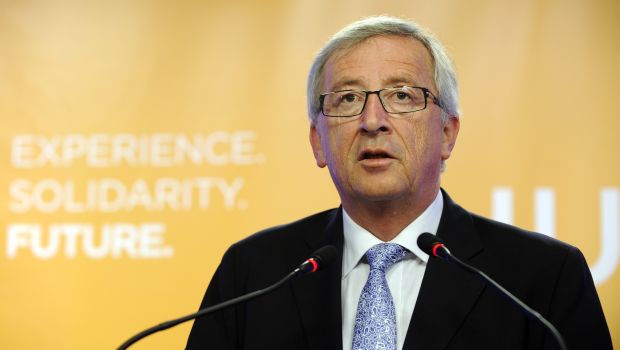
Jean Claude Junker makes a statement on the provisional results of the European elections in Brussels May 25, 2014. (Reuters/Eric Vidal)
Brussels, Reuters—European Union leaders offered political concessions to Britain after outvoting Prime Minister David Cameron on Friday over the nomination of Jean-Claude Juncker as European Commission president, EU and British officials said.
The leaders added a paragraph to their final summit statement saying Britain’s concerns about the future direction of the EU “will need to be addressed” and that the concept of “ever-closer union” in EU treaties allowed for different paths of integration for different countries.
They also said they would review the process for appointing the head of the EU executive once the new Commission was in place, a nod to Cameron’s objection that the European Parliament had effectively grabbed the nomination power from EU leaders.
A British official said that in a discussion after the vote on Juncker Cameron had argued: “It is important you recognise there are real debates here for Britain and British concerns.”
This had led to additions to the summit conclusions: “It is a start,” the official said. “We have got that marker down now.”
The official said the following points had been added to the formal conclusions of the Council, which have yet to be published:
“The UK raised some concerns related to the future development of the EU. These concerns will need to be addressed.
“In this context, the European Council noted that the concept of ever closer union allows for different paths of integration for different countries, allowing those that want to deepen integration to move ahead, while respecting the wish of those who do not want to deepen any further.
“Once the new European Commission is effectively in place, the European Council will consider the process for the appointment of the President of the European Commission for the future, while respecting the Treaties.”
At a news conference, Cameron said: “We must accept the result and Britain will now work with the commission president as we always do to secure our national interest. But let me be absolutely clear: this is a bad day for Europe.
“It risks undermining the position of national governments, it risks undermining the power of national parliaments and it hands new power to the European Parliament.
“It is therefore important that the European Council has agreed today to review what has happened and to consider how we handle the next appointment of the next commission president next time around. Turning to the future this whole process has simply reinforced my conviction that Europe needs to change.
“For first time, all my 27 fellow heads of government have agreed explicitly that they need to address Britain’s concerns about the EU. It is in the agreed conclusions the European Council issues today. The conclusions also state explicitly that ever closer union allows for different paths of integration for different countries and respects the wishes of those like Britain that do not want deeper integration. This is an important statement but . . . it is not the end of the matter. Far from it. The campaign to reform the EU has a long way to go.”
